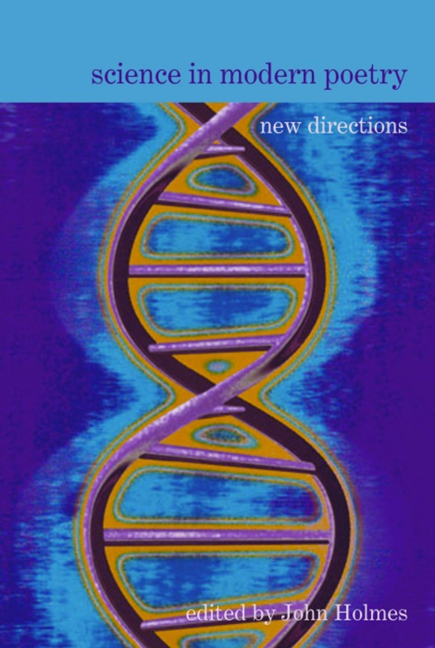Book contents
- Frontmatter
- Contents
- List of Contributors
- Acknowledgements
- Introduction
- Part I Science and Contemporary Poetry: Cross-Cultural Soundings
- 1 The Function of Antagonism: Miroslav Holub and Roald Hoffmann
- 2 Cutting and Pasting: Language Writing and Molecular Biology
- 3 The Poetics of Consilience: Edward O. Wilson and A. R. Ammons
- 4 Poetry, Science and the Contemporary University
- Part II Science in Modernist Poetry: Appropriations and Interrogations
- Part III Darwinian Dialogues: Four Modern Poets
- Afterword
- Bibliography
- Index
1 - The Function of Antagonism: Miroslav Holub and Roald Hoffmann
from Part I - Science and Contemporary Poetry: Cross-Cultural Soundings
- Frontmatter
- Contents
- List of Contributors
- Acknowledgements
- Introduction
- Part I Science and Contemporary Poetry: Cross-Cultural Soundings
- 1 The Function of Antagonism: Miroslav Holub and Roald Hoffmann
- 2 Cutting and Pasting: Language Writing and Molecular Biology
- 3 The Poetics of Consilience: Edward O. Wilson and A. R. Ammons
- 4 Poetry, Science and the Contemporary University
- Part II Science in Modernist Poetry: Appropriations and Interrogations
- Part III Darwinian Dialogues: Four Modern Poets
- Afterword
- Bibliography
- Index
Summary
The interdisciplinary study of literature and science aims at giving the lie to C. P. Snow's charge that there is an unscientific, even anti-scientific, flavour to modern literary culture. The primary goal of ‘one culture’ criticism, as it is sometimes called, has been to overcome perceived antagonisms between the two fields, freeing up traffic in ideas, analysing creative connections and abrasions at the level of language. In the main, that means literary critics subjecting the writing of science, and writing about science, to literary analysis. It does not often mean scientists writing about literature. Current work in ‘literature and science’ is, in short, interdisciplinary principally from the vantage point of the humanities. This is in part why the emphasis in the theoretical and conceptual literature has been so accented towards understanding, connection, creative alliance. More politicised critiques of the epistemological claims of science, and the technological and economic systems supporting it, can play a part in what ‘literature and science’ does, but they have more commonly been the domain of science studies and the history of science. The emphasis in interdisciplinary work has much more typically been on rhetoric – above all on narrative and metaphor – as the common ground between the two fields and the means by which science becomes amenable and accessible to literary analysis.
Within these limits, the institutional successes of this still young field have been impressive. There are journals dedicated to its pursuit, many good books and essays, popular undergraduate and graduate courses, PhDs. There are societies for the study of literature and science in Britain, America, Europe, Australasia. It is bracing, then, to find something more robust than ‘abrasion’ going on when one of the most respected writers to have bridged the literature–science divide in recent decades reflects on the relative credibility of the two disciplines. This is Miroslav Holub, in one of the last essays he wrote, ‘Rampage, or Science in Poetry’, delivered at the Edinburgh Festival in 1998, just before his death, but not published in English until 2006.
- Type
- Chapter
- Information
- Science in Modern PoetryNew Directions, pp. 19 - 37Publisher: Liverpool University PressPrint publication year: 2012

